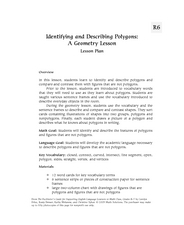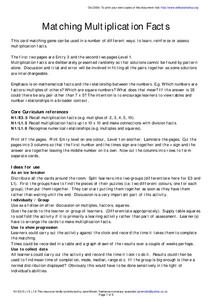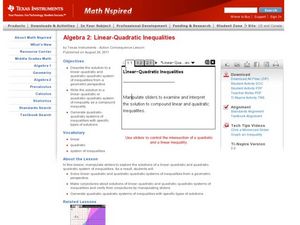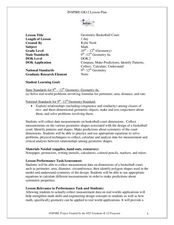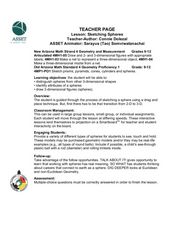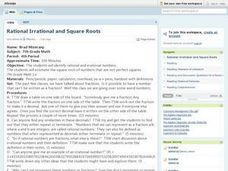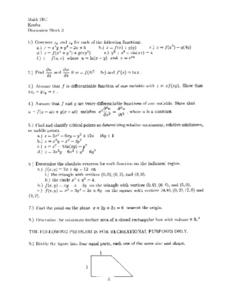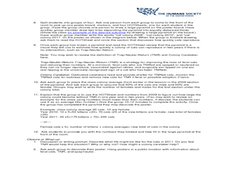Curated OER
Proportionality in Tables, Graphs, and Equations
Students create different methods to analyze their data. In this algebra lesson, students differentiate between proportion and non-proportional graph. They use the TI-Navigator to create the graphs and move them around to make their...
Curated OER
Mathematics in Robotics
Students build and create using math. For this geometry lesson, students differentiate between congruent and similarity as they observe polygons. They create robots with different functions using properties of geometry.
Curated OER
Identifying and Describing Polygons
Young scholars identify the different properties of polygons. In this geometry lesson plan, students differentiate between polygons and non-polygons. They review important vocabulary to help them understand the properties of polygons.
Curated OER
Multiplication Flashcards
In this math learning exercise, students participate in a variety of math activities using multiplication flashcards. The multiplication cards range from numbers one through ten.
Curated OER
Linear-Quadratic Inequalities
High schoolers graph linear and quadratic functions. In this algebra lesson, students create graph with specific coordinate points. They use the Ti to visualise and differentiate between the two functions.
Curated OER
Race The Rapper: Slopes
Students calculate the slope of the equation In this algebra lesson, students graph coordinate pairs of linear equations and identify the relationship between x and y values and slope. They differentiate between functions and relations....
Curated OER
Geometric Basketball Court
Pupils calculate the area and perimeter of a basketball court. In this geometry lesson, students differentiate between similarity and congruence of geometric objects. They test conjectures and use it to solve problems.
Curated OER
Ara of Circles
Pupils identify the differentiate the different properties of circles and parallelograms. In this geometry lesson, students calculate the area of each solid and identify the formula. They relate Pi to the circumference of a circle.
Curated OER
Linear and Nonlinear Functions
Learners identify properties of a line. In this algebra instructional activity, students differentiate between functions and nonfunctions. They use the slope and y intercept to graph their lines.
Curated OER
Camping with a Triangular Prism and Its Net
Learners differentiate triangular prisms from other prisms using nets. In this geometry lesson, students define the properties of a triangular prism and its symmetry. They build a triangular prism moving lines around.
Curated OER
Pyramids on Parade/Nets
Students sketch the shape of three dimensional pyramids using nets. In this geometry lesson, students differentiate a pyramid from other three dimensional shape. They define the attributes of pyramids.
Curated OER
Sketching Prisms
Learners sketch and create nets of different polygons.In this geometry lesson plan, students differentiate prisms from other three-dimensional shapes. They define the properties of prisms.
Curated OER
Sketching Spheres
Students investigate spheres through sketches. In this geometry lesson, students sketch two and three dimensional shapes creating nets. They find and differentiate between the nets for prisms, pyramids, cones, cylinders and spheres.
Curated OER
A Sphere and Its Net
Students identify and sketch the nets for sphere. In this geometry activity, students differentiate between two and three dimensional shapes. They find the surface area of each sphere.
Curated OER
Absolute Maximum and Minimum
Students calculate the maximum and minimum of each function. In this algebra lesson, students collect and graph data to analyze it. They differentiate between the absolute max and min and the maxima and minima of each function.
Curated OER
One Vs. One Hundred
Learners explore the concept of place value. They differentiate between digits and their values as it related to addition and subtraction. Through the use of technology and manipulatives students investigate the place value of digits by...
Curated OER
Rational, Irrational and Square Roots
Seventh graders identify rational and irrational numbers and then, estimate the square root of numbers that are not perfect squares. They then identify what the radical is and differentiate between that and a division symbol clearly....
Curated OER
Connecting Translations, Reflections, and Rotations
Learners differentiate between translation, reflection and rotation. They explore the 3 types of transformation using Cabri Jr. and build on previous knowledge in this lesson.
Curated OER
Discussion Sheet 3: Function
In this function instructional activity, students compute functions, classify critical points and determine the absolute extrema for an indicated region. This one-page instructional activity contains approximately nine multi-step problems.
Curated OER
Types of Things
Students explore the differences between man-made and natural objects. In this instructional activity designed to compare properties of objects, students differentiate between natural and man-made objects and complete an activity...
Curated OER
The Tale of the Feral - Care and Multiplication of Feral Cats
Students differentiate between a feral cat and a domesticated cat. In this cat lesson plan, students use the scientific method, calculate averages, solve story problems, and learn how a caretaker can help a feral colony live safely.
Curated OER
The Circle's Measure
Students explore circumference and diameter. For this math lesson, students apply their knowledge of circumference and diameter to solve mathematical riddles. Students apply this knowledge to find circumference and diameter of various...
Curated OER
Similar Triangles
Students differentiate between similar and congruent triangles. In this geometry lesson, students identify the missing side and angle of a triangle. They identify the different ratio and proportion of the sides of a triangle.
Curated OER
Understanding Slope
Students find and define the slope of a line. In this algebra lesson,students differentiate between positive and negative slopes. They define the properties and slopes of vertical and horizontal lines.




